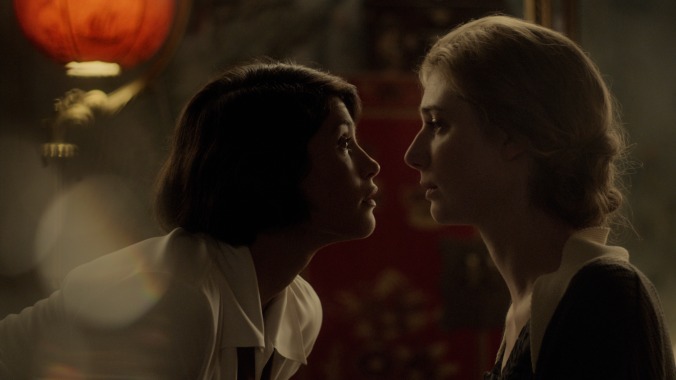Elizabeth Debicki brings what passion she can to the banal biopic romance of Vita & Virginia

Taking on a role for which one of the world’s most famous actors has won an Oscar—not all that long ago, even—has to be mighty intimidating. Didn’t work out so well for Julianne Moore as the new Clarice Starling in Hannibal, but Moore eventually received a gold statuette of her own, and so may Elizabeth Debicki, one day. It probably won’t be for Debicki’s performance as Virginia Woolf in Vita & Virginia, however, even if she’s far and away the film’s most impressive element. Chronicling the relatively brief romantic/sexual phase of the long relationship between Woolf and aristocratic fellow writer Vita Sackville-West (Gemma Arterton), this is yet another mundane biopic with no particular point of view, content simply to dramatize key events in its famous subjects’ lives. That it builds to the writing and publication of Woolf’s landmark novel Orlando, whose title character Sackville-West inspired, only makes one wish to be watching Sally Potter’s 1992 adaptation of Orlando (starring Tilda Swinton) instead.
Unlike Nicole Kidman, who famously wore a prosthetic nose in The Hours and otherwise glammed herself down as much as possible, Debicki makes little attempt to replicate Woolf’s appearance, apart from wearing her hair in a bun most of the time. Indeed, she appears to have been wildly miscast during her first significant scene, which sees her dancing solo at some literary soirée and looking as if she’s just finished a commercial shoot for Estée Lauder. (The film’s anachronistic, largely electronic score, courtesy of Fleabag composer Isobel Waller-Bridge, doesn’t help in that regard.) Once Woolf becomes besotted with Sackville-West, however, Debicki taps into universal feelings of insecurity and apprehension, creating a compelling portrait of a woman struggling desperately to hold them at bay. Arterton, on the other hand, dials Sackville-West’s libertine blitheness up so high that she can’t even ring a doorbell like a normal person—everything’s a calculated gesture, even when the character is completely alone. This mismatch undermines all efforts to forge a tangible emotional bond between the two women, and since that bond is the film’s raison d’être, there’s not much left apart from the endless recitation of their correspondence.
Those letters were presumably an integral part of Eileen Atkins’ stage play, from which Vita & Virginia was adapted (though that information is buried deep, deep in the closing credits—somebody didn’t want any whiff of theater attached to this). Director Chanya Button shoots the epistolary interludes in theatrical style, with the actors speaking the text directly to the camera as if delivering a monologue at center stage; she then breaks it up cinematically with close-up shots of their eyes and mouths. The effect feels amateurish, as does a recurring suggestion of Woolf’s mental illness (she’s retroactively believed to have had bipolar disorder) in which she hallucinates vines spontaneously growing out of walls and floors. None of this would have been fatal, however, had the film’s central relationship genuinely come to life. Instead, we spend nearly as much time watching Woolf and Sackville-West’s respective husbands (played by Peter Ferdinando and Rupert Penry-Jones) whining about their semi-open marriages, with countless eloquent variations on “I won’t stop you from seeing her, but I don’t like it one bit.” Once Sackville-West gets bored with Woolf and starts seeing another woman, garden-variety jealousy takes over. Not quite as fascinating as the story of a man who inexplicably metamorphoses into a woman and doesn’t age for 300 years.